|
De Canadese schrijver Joseph Boyden werd geboren op 31 oktober 1966 in Willowdale, Ontario. Zie ook mijn blog van 31 oktober 2010 en eveneens alle tags voor Joseph Boyden op dit blog.
Uit: The Orenda
“Now the snow covering the lake glows the colour of a robin’s egg as sunlight tries to break through cloud. If I live through this day I will always remember to pay attention to the tickle of dryness at the back of my throat at this moment, the feeling of a bad headache coming. I’ve just begun to walk to the girl to offer her comfort, if she’s still alive, when a dog’s howl breaks the silence, its excitement in picking up our scent making me want to throw up. Other dogs answer it. I forget how my toes have begun to blacken, that I’ve lost so much weight I can barely support my gaunt frame, that my chest has filled with a sickness that’s turned my skin yellow.
I know dogs, though. As in my old world, they are one of the few things in this new one that bring me comfort. And this pack’s still a long way away, their voices travelling easy in the frozen air. When I bend to help the girl up, I see the others have already disappeared into the shadows of trees and thick brush.
My terror of being left behind for those chasing me, who will make sure my death is slow and painful, is so powerful that I now weigh taking my own life. I know exactly what I must do. Asking Your divine mercy for this, I will strip naked and walk out onto the lake. I calculate how long all this will take. It’s my second winter in the new world, after all, and my first one I witnessed the brutality of death by freezing. The first ten minutes, as the pack races closer and closer, will certainly be the most excruciating. My skin will at first feel as if it’s on fire, like I’m being boiled in a pot. Only one thing is more painful than these early minutes of freezing, and it’s the thawing out, every tendril of the body screaming for the agony to stop. But I won’t have to worry about that. I will lie on the frozen lake and allow the boiling cold to consume me. After that handful of minutes the violent shaking won’t even be noticed, but the sharp stabs of pain in the forehead will come, and they will travel deeper until it feels my brain is being prodded with fish spines.»
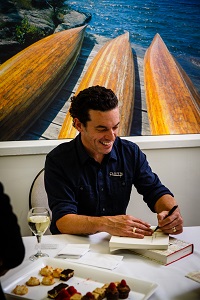
Joseph Boyden (Willowdale, 31 oktober 1966)
De Amerikaanse dichter, schrijver en literatuurcriticus Bruce Bawer werd geboren op 31 oktober 1956 in New York. Zie ook mijn blog van 31 oktober 2010 en eveneens alle tags voor Bruce Bawer op dit blog.
Uit: While Europe Slept
“At first glance, Hirsi Ali might have seemed an unlikely ally for van Gogh: a vivacious Somali-born beauty who'd forsworn her native Islam, she was devoted to the preservation of Dutch democracy and the rescue of her country's Muslims--especially women--from the tyranny of their subculture. I'd read a good deal about her in the Dutch press and hoped to write about her myself; in fact, a friend of mine who worked for an Oslo think tank had arranged to meet her in The Hague the following Monday and had invited me to go along. I'd already booked the flight.
Van Gogh's murder came as a shock, even though I'd seen something like it coming for years. In 1998, I'd lived in a largely Muslim neighborhood of Amsterdam, only a block away from the radical mosque attended by Bouyeri. There I'd seen firsthand the division between the native Dutch and their country's rapidly growing Muslim minority. That division was stark: the Dutch had the world's most tolerant, open-minded society, with full sexual equality, same-sex marriage, and libertarian policies on soft drugs and prostitution. Yet many Dutch Muslims kept that society at arm's length, despising its freedoms and clinging to a range of undemocratic traditions and prejudices.
Did Dutch officials address this problem? No. Like their politically correct counterparts across Western Europe, they responded to it mostly by churning out empty rhetoric about multicultural diversity and mutual respect--and then changing the subject. I knew that by tolerating intolerance in this way, the country was setting itself on a path to cataclysmic social confrontation; yet whenever I tried--delicately--to broach the topic, Dutch acquaintances made clear that it was off limits. They seemed not to grasp that their society, and Western Europe generally, was a house divided against itself, and that eventually things would reach the breaking point.”
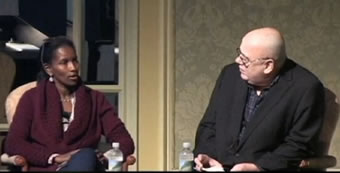
Bruce Bawer (New York, 31 oktober 1956)
Ayaan Hirsi Ali en Bruce Bawer
De Engelse dichter John Keats werd geboren op 31 oktober 1795 in Finsbury Pavement in Londen. Zie ook mijn blog van 31 oktober 2010 en eveneens alle tags voor John Keats op dit blog.
On the Sea
It keeps eternal whisperings around
Desolate shores, and with its mighty swell
Gluts twice ten thousand Caverns, till the spell
Of Hecate leaves them their old shadowy sound.
Often 'tis in such gentle temper found,
That scarcely will the very smallest shell
Be moved for days from where it sometime fell.
When last the winds of Heaven were unbound.
Oh, ye! who have your eyeballs vexed and tired,
Feast them upon the wideness of the Sea;
Oh ye! whose ears are dinned with uproar rude,
Or fed too much with cloying melody---
Sit ye near some old Cavern's Mouth and brood,
Until ye start, as if the sea nymphs quired!
On death
1.
Can death be sleep, when life is but a dream,
And scenes of bliss pass as a phantom by?
The transient pleasures as a vision seem,
And yet we think the greatest pain's to die.
2.
How strange it is that man on earth should roam,
And lead a life of woe, but not forsake
His rugged path; nor dare he view alone
His future doom which is but to awake.
Op de Dood
1.
Kan dood slaap zijn, als leven dromen is
En het geluk vervliet als ijdele schijn?
De korte vreugde laat ons geen heugenis
En toch lijkt sterven ons de diepste pijn.
2.
Vreemd is het, dat de mens op aarde zwerft
En leeft in weedom, maar geen uur verzaakt
Zijn doornig pad; en dat zijn blik hier derft
Het zicht op streken waar hij straks ontwaakt.
Vertaald door Bert Voeten
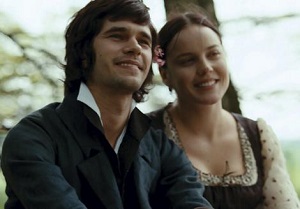
John Keats (31 oktober 1795 – 23 februari 1821)
Ben Whishaw als John Keats en Abbie Cornish als Fanny Brawne in de film Bright Star uit 2009
De Engelse schrijver Nick Stone werd geboren op 31 oktober 1966 in Cambridge. Zie ook mijn blog van 31 oktober 2009 en ook mijn blog van 31 oktober 2010 en eveneens alle tags voor Nick Stone op dit blog.
Uit: Mr. Clarinet
« Max hadn't made a fortune as a private detective, but he'd done OK—enough to get by and have a little extra to play with. His wife, who was a qualified accountant, had managed the business side of things. She'd put a fair bit of rainy-day money away in their three savings accounts, and they had points in The L Bar, a successful yuppie joint in downtown Miami, run by Frank Nunez, a retired cop friend of Max's. They'd owned their house and two cars outright, taken three vacations every year, and eaten at fancy restaurants once a month.
He'd had few personal expenses. His clothes—suits for work and special occasions, khakis and T-shirts at all other times—were always well cut but rarely expensive. He'd learned his lesson after his second case, when he'd got arterial spray on his five-hundred-dollar suit and had to surrender it to forensics, who later handed it to the DA, who recycled it in court as Exhibit D. He sent his wife flowers every week, bought her lavish presents on her birthday and at Christmas and on their anniversary; he was also generous to his closest friends. He had no addictions. He'd quit cigarettes and reefer when he'd left the force; booze had taken a little longer but that had gone out of his life too. Music was his only real indulgence—jazz, swing, doo-wop, rock 'n' roll, soul, funk, and disco; he had five thousand CDs, vinyl albums, and singles he knew every note and lyric to. The most he'd ever spent was when he'd dropped four hundred bucks at an auction on an autographed original double ten-inch vinyl copy of Frank Sinatra's "In the Wee Small Hours of the Morning." He'd framed it and hung it in his study, opposite his desk. When his wife asked, he lied and told her he'd picked it up cheap at a house-repo sale in Orlando.”
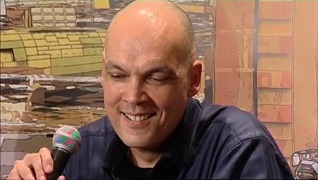
Nick Stone (Cambridge, 31 oktober 1966)
De Braziliaanse dichter Carlos Drummond de Andrade werd geboren op 31 oktober 1902 in Itabira, een klein dorpje in de staat Minas Gerais. Zie ook alle tags voorCarlos Drummond de Andrade op dit blog en ook mijn blog van 31 oktober 2010
The House Of Times Past
I knocked on the door of times past, no one answered.
I knocked a second time and then another and another.
No answer.
The house of times past is halfway covered with vines
the other half is covered with ashes.
The house where no one dies and I am knocking and
calling.
Just for the pain of calling and not being heard.
Just only to keep knocking. The echo brings back
my anxiety of opening these frozen steps.
Night and day mingle together in the waiting
in the knocking and knocking.
Times past certainly do not exist.
And the empty building has been condemned.
Vertaald door Mariza Góes
Lost Hope
I missed the trolley and the hope.
Pale, I go back home.
The street is useless and no car
would drive over my body.
I will climb the slow steep slope
where paths are blended
All of them lead to
the beginning of drama and flora.
I do not know if I am suffering
or if is someone having fun
(and why not?) in the scarce night
with an insoluble piccolo.
And we, long time ago
shouted yes! to eternity.
Vertaald door Jodey Bateman
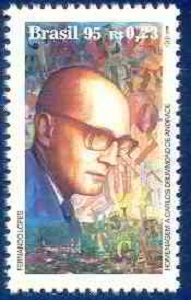
Carlos Drummond de Andrade (31 oktober 1902 – 17 augustus 1987)
De Russische schrijfster Irina Denezhkina werd geboren op 31 oktober 1981 in Yekaterinburg. Zie ook alle tags voor Irina Denezhkina op dit blog en ook mijn blog van 31 oktober 2009 en ook mijn blog van 31 oktober 2010
Uit: Give Me: Songs for Lovers
“I wanted to do something, but it was like my arms and legs had gone numb. I only vaguely remember what happened next. There were about twenty guys giving Vova a vicious kicking. He was groaning and howling. He tried to fend them off with his arms, rolling from side to side, always coming up against their Doc Martens. The blood spread across the pavement in a dark puddle.
People gathered around, curious. Two fat men, a granny with a mesh shopping bag, a little girl with an ice cream ... I heard a roar and shuddered. Vova was clutching his head, crawling on all fours and screaming. Some guy in baggy pants was lashing him with a chain.
"What's wrong with you?"
The twelve-year-old kid was standing beside me, staring hard into my face. Just a little kid like any other. Scruffy, short hair, in a T-shirt with the words "Fuck the stupid chicks" on it. He had such bright, innocent eyes. I felt like some old woman full of wisdom and experience. I said grandly:
"You little bastards." Then I thought a moment and said it again. "Bastards. And assholes."
Twenty against one's not right; never. He may be some loser I couldn't give a shit about, but it's the principle of the thing.
The boy squeezed his lips together and thought for a while, then answered brightly:
"Him and his mob fucked Denya over. He split Denya's head open ..."
"All the same ..." I said, trying to smooth things over.
"What's all the same? What's it to you?"
Calm down, I thought. No one's going to beat me up; quite the opposite, they're just giving me the eye.
I shrugged.
The tall rapper came over to us, jangling his chain.”
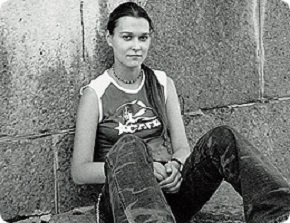
Irina Denezhkina (Yekaterinburg, 31 oktober 1981)
Zie voor nog meer schrijvers van de 31e oktober ook mijn blog van 31 oktober 2011 deel 2.
|



